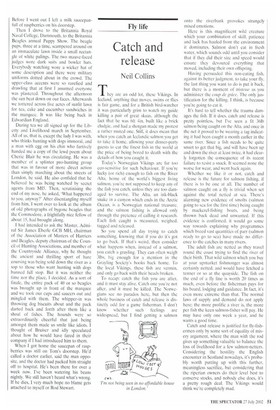Catch and release
Neil Collins
They are an odd lot, these Vikings. In Iceland, anything that moves, swims or flies is fair game, and for a British bird-watcher it was particularly grim to watch my guide killing a pair of great skuas, although the fact that he was 6ft 4in, built like a brick cludgie, and had a shotgun made my protest a rather muted one. Still, it does mean that when you catch an Icelandic salmon you get to take it home, allowing your dinner-party guests to cat the finest fish in the world at the price of being bored to death with the details of how you caught it.
Today's Norwegian Vikings are far too eco-sensitive for such behaviour. If you're lucky (or rich) enough to fish on the River Alta, home of the world's biggest living salmon, you're not supposed to keep any of the fish you catch, unless they are too damaged to survive. The Alta, an ink-black snake in a canyon which ends in the Arctic Ocean, is a Norwegian national treasure, and the salmon fishing is allowed only through the pretence of calling it research. Each fish caught is measured, weighed, tagged and released.
So you spend all day trying to catch something, knowing that if you do it's got to go back. If that's weird, then consider what happens when, instead of a salmon, you catch a grayling. They can often weigh 3lbs, big enough for a mention in the Grayling Society's books hack home. To the local Vikings, these fish are vermin, and only go back with their heads broken.
To recap: catch the fish you are after, and it must stay alive. Catch one you're not after, and it must be killed. The Norwegians see no paradox here, but then the whole business of catch and release is distinctly odd for a game fisherman. I don't know whether such feelings are widespread, but I find getting a salmon onto the riverbank provokes strangely mixed emotions.
Here is this magnificent wild creature which your combination of skill, patience and luck has hauled from the environment it dominates. Salmon don't eat in fresh water, which sounds odd until you consider that if they did their size and speed would ensure they devoured everything that moved, including their own offspring.
Having persuaded this non-eating fish, against its better judgment, to take your fly, the last thing you want to do is put it back, but there is a moment of tristes.se as you administer the coup de grace. The only justification for the killing. I think, is because you're going to eat it.
It's hard to tell whether the trauma damages the fish. If it does, catch and release is pretty pointless, but I've seen a fit 36Ib salmon being caught on the Alta, and once in the net it proved to he wearing a tag indicating it had been caught a month earlier in the same river. Since a fish needs to be quite smart to get that big, and will have been up and down the river at least twice, it had clearly forgotten the consequence of its recent failure to resist a snack. It seemed none the worse for wear, and went hack again.
Whether we like it or not, catch and release is the future for salmon fishing, if there is to be one at all. The number of salmon caught on a fly is trivial when set against the total netted at sea. There's alarming new evidence of smolts (salmon going to sea for the first time) being caught by mackerel-fishing boats, and being thrown back dead and unwanted. If this evidence is confirmed, it would go some way towards explaining why programmes which breed vast quantities of parr (salmon ready to go to sea) have made no difference to the catches in many rivers.
The adult fish are netted as they travel round the coast trying to find the river of their birth. That wild salmon which you buy at your upmarket fishmonger was almost certainly netted, and would have fetched a termer or so at the quayside. The fish on the end of a fly line is worth 20 times as much, even before the fisherman pays for his board, lodging and guidance. In fact, it's even more extreme than that. The normal laws of supply and demand do not apply here; the more prolific a river is, the more per fish the keen salmon-fisher will pay. He may have only one week a year, and he wants a good time.
Catch and release is justified for fly-fishermen only by some sort of equality of misery argument, where the man with the rod gives up something valuable to balance the loss of livelihood for a few salmon-netters. Considering the hostility the English encounter in Scotland nowadays, it's probably worth putting up with this further, meaningless sacrifice, but considering that the riperian owners do their level best to conserve stocks, and nobody else does, it's a pretty rough deal. The Vikings would think we're completely mad.
































































 Previous page
Previous page